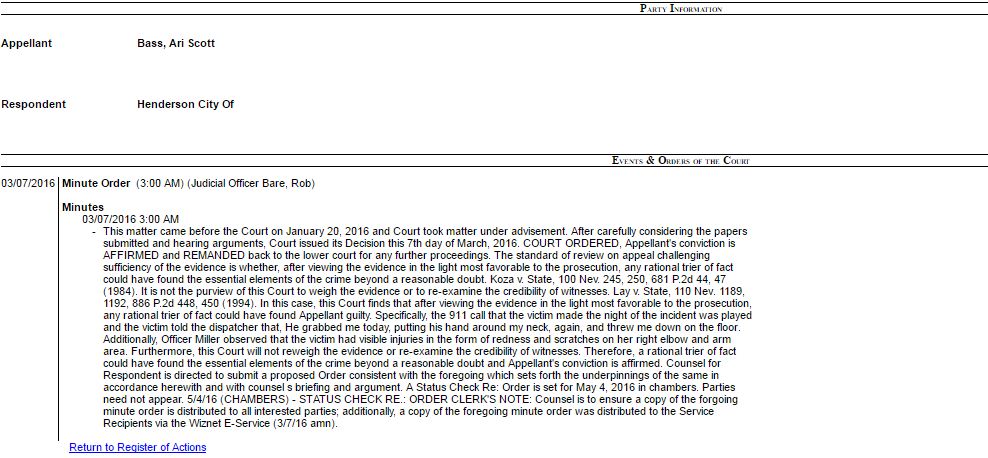"Debtor’s misguided criticisms of the IAA are an example of Debtor’s attempt to portray himself as a victim"
Source and Full Motion
http://ia801505.us.archive.org/20/items/gov.uscourts.nvb.348854/gov.uscourts.nvb.348854.155.0.pdf
SECOND AMENDED COMPLAINT BY CREDITORS EXCELSIOR MEDIA CORP., AND LIBERTY MEDIA
HOLDINGS, LLC TO DETERMINE NON-DISCHARGEABILITY OF DEBTS
"III. GENERAL ALLEGATIONS
7. Defendant Randazza is the former in-house General Counsel of E/L. Randazza was employed as E/L’s General Counsel continuously from June, 2009 until August 2012.
8. Excelsior is a sister company to various entities including Liberty and Corbin Fisher. Corbin Fisher is an on-line entertainment website and brand name whose intellectual
property is owned by Liberty. Excelsior is a film production company that creates videos for the Corbin Fisher brand.
E/L has consistently endeavored to and succeeded at conducting its business in a principled and professional manner. E/L relocated its headquarters from San Diego, California to Las Vegas in February 2011.
9. Randazza also relocated from San Diego, California to Las Vegas in 2011 to continue his employment relationship with E/L. Randazza markets himself as a “specialist” in First Amendment and intellectual property law, particularly with regard to the adult entertainment industry.
10. E/L and Randazza became acquainted while Randazza was an associate at a firm specializing in First Amendment related legal work in Florida. E/L later decided to hire a General Counsel. Randazza pursued and accepted the position. Randazza drafted an employment agreement, which was executed by the parties in June, 2009 (“Employment Agreement”).
Randazza at no time advise Plaintiffs that they should seek independent counsel to review the agreement even though Plaintiffs were obviously unrepresented. During the course of his
employment with E/L, Randazza was an integral part of E/L’s management and, along with several other executives, participated in making many of E/L’s major corporate decisions.
11. The primary reason E/L decided to hire a General Counsel was to ensure its intellectual property was protected. One of the most significant challenges faced by E/L and all companies in the film and entertainment industry is the illegal downloading and sharing of content/videos produced by E/L. However, Randazza was tasked with handling all of E/L’s legal matters.
A. THE EMPLOYMENT AGREEMENT
12. Pursuant to the Employment Agreement, Randazza was to wind down his private practice during his first 90 days of employment and become E/L’s full-time General Counsel.
13. Section “6.C” of the Employment Agreement permitted Randazza to continue to provide professional services to a “limited number of outside clients” during non-working hours if such work did not present a conflict of interest for E/L. Contrary to his obligations under the Employment Agreement and without the knowledge of E/L, Randazza continued to aggressively grow his private practice during his employment after becoming E/L’s General Counsel.
14. Randazza’s compensation consisted of an annual salary of $208,000. Randazza also included in the Employment Agreement the unique arrangement of a nondiscretionary bonus of 25% of any settlement funds paid to E/L.
15. At the time of the execution of the Employment Agreement, the parties contemplated that Randazza would be handling all of E/L’s legal matters independently. Instead, Randazza began to utilize his own firm, Randazza Legal Group (“RLG”) and various outside counsel to assist in E/L’s legal matters.
16. The Employment Agreement also required that E/L provide Randazza with a laptop computer and PDA/phone, which were to be primarily used for E/L business with only occasional and incidental personal use permitted. The Employment Agreement further provided that such equipment was not to be used for professional services rendered to other clients.
17. The Employment Agreement provided for severance in the amount of 12 weeks of salary if E/L were to unilaterally terminate Randazza in the fourth year of employment or later.
There is no severance obligation if Randazza resigned or was terminated for cause.
18. The Employment Agreement also includes a governing law provision stating “[t]his Agreement shall be governed by and construed in accordance with the laws of the State of California, without regard to conflict of laws.” Randazza was able to reside virtually anywhere he wanted. Initially, Randazza lived and worked in San Diego, California. However, Randazza relocated to Las Vegas, Nevada in June 2011, just as few months after E/L relocated its headquarters.
19. At Randazza’s request, E/L hired Erika Dillon (“Dillon”), a paralegal. Dillon was employed by E/L as a paralegal at the time of Randazza’s resignation. Dillon left her employment after Randazza’s resignation at Randazza’s request B. ISSUES ARISE BETWEEN E/L AND RANDAZZA
i.
Randazza’s Non-E/L Work
20. As noted above, under the Employment Agreement Randazza was obligated to wind down his private practice during the first 90 days of his employment with E/L.
21. After becoming E/L’s General Counsel, however, Randazza kept adding clients to his practice, RLG, and over the period from October 2009 through August 2012, he billed over 1,643 hours to clients for work unrelated to E/L (and not including pro bono work). This amounts to an average of 47 hours per month.
During Randazza’s employment at E/L, he never billed less than 14.5 hours in a given month to other clients and in many months he billed between 50 and 90 hours to such clients. During the period from September 2011 through January 2012, Randazza billed 390.65 hours to non-E/L and non-pro bono clients, an average of over 78 hours per month.
This pattern of extensive and increasing work for non-E/L clients is evidence that Randazza had no intention of winding down his private practice as required by the Employment Agreement.
22. During his employment with E/L, including during the period from September 2011 through January 2012, E/L paid Randazza’s full salary and benefits, including bar dues in multiple jurisdictions.
ii.
Randazza’s TNAFlix Relationship
23. Randazza, through RLG, represented Liberty in a lawsuit that he filed in the United States District Court for the Southern District of California against TNAFlix (“TNA”) (Case. No. 10-CV-1972-JHA-POR) alleging that TNA (a file-sharing website) infringed Liberty’s copyrighted works (the “TNA Matter”). Valentin Gurvits, Esq. (“Gurvits”) of the Boston Law Group, LLP (“Boston Law”) represented TNA.
24. In December 2010 and January 2011, Randazza and Gurvits negotiated a settlement of the TNA Matter. During the course of those negotiations, Gurvits raised a concern about his client (TNA) being sued by other copyright owners in the future based on the same or similar allegations made by Liberty against TNA in the TNA matter.
In an email dated December 7, 2010, Randazza advised Gurvits that he “could largely prevent other plaintiffs from entering the fray.”
25. According to Randazza, Gurvits wanted to pay Randazza a “fee” of $5,000 in order to conflict Randazza out of future cases against TNA. In an email dated December 22, 2010, Randazza responded to Gurvits’ offer as follows:
As far as conflicting me out of future cases, that will require significantly
more than $5,000. In fact, I have someone waiting in the wings with a
$50k retainer right now.
Naturally, I’m in a strange ethical bind, as your offer to conflict me out of
future cases against your client is something that would benefit my current
client. Accordingly, I would be willing to be conflicted out of cases
against TNA, but that $5k figure has to come up. Either that, or you can
give [Liberty] what they asked for, and I’ll conflict myself out for a token
payment
26. Randazza and Gurvits continued to discuss the prospect of conflicting Randazza out of future cases against TNA during the course of negotiating a settlement of the TNA Matter.
For example, on January 11, 2011 Randazza wrote in an email to Gurvits:
Keeping me out of the TNA game is a little more complicated.
If your client wants to keep me personally out of the TNA game, then I think that there needs to be a little grave for me. And it has to be more than the $5k you were talking about before, I’m looking at the cost of at least a new Carrera in retainer deposits after circulating around the adult entertainment expo this week. I’m gonna want at least used BMW money.
In order to conflict me out of future matters, I suggest this:
Your firm retains me as “of counsel” to you. I get $5k per month (for six months) paid to me, from you (TNA will reimburse you, I presume). I will render advice on TNA and TNA only, and I’ll be Chinese walled from your other clients so that other conflicts are not created.
*******************************
That way, I’m adequately compensated for my loss of major potential work, and I’m conflicted out of acting adversely to TNA.
27. On January 12, 2011, Randazza apparently discovered that he was ethically prohibited from discussing limitations on his right to practice law during the course of settlement negotiations on behalf of a client, and sent an email to Gurvits saying that he could no longer discuss it, saying: “But I’m certain now that such an arrangement is unethical, in the terms we’ve been discussing it.” Nevertheless, Randazza recommended finding “some other way of addressing [TNA’s] interests,” and stated as follows:
Like I said before, if TNA wants to hire me *after* settlement, on terms that we discuss *after* settlement, then my phone line will be open.
However, it seems that if we place any part of a “buyoff” as a condition of settlement, then all four of us could wind up in bar trouble. I’m certainly not risking it.
28. On February 1, 2011, Liberty signed a Settlement Agreement and General Release of Claims (the “TNA Settlement Agreement”) under which Liberty agreed to dismiss its claims against TNA without prejudice in exchange for payment of fifty thousand dollars ($50,000.00).
The next day (February 2, 2011) and before Randazza had even received the signature of Gurvits’ client on the TNA Settlement Agreement and the sameday that Randazza received the settlement payment from TNA, Randazza sent an email to Gurvits asking if TNA wanted “a retainer letter form [him].”
29. On February 11, 2011 Randazza emailed Gurvits a draft retainer letter from TNA to sign, which required a $36.000.00 retainer to be paid at the outset of the representation and deemed to be earned upon receipt. TNA did not, however, immediately sign the retainer letter, Randazza wrote to Gruvits in late June 2011 stating, “You will recall that I am not conflicted out of representing another client against [TNA].”
Source and Full Document, Case Filing
http://ia801505.us.archive.org/20/items/gov.uscourts.nvb.348854/gov.uscourts.nvb.348854.156.0.pdf
How in the WORLD is Marc Randazza still a Lawyer? WOW



